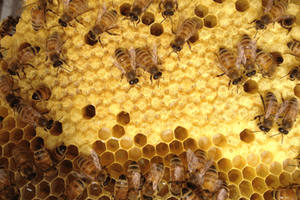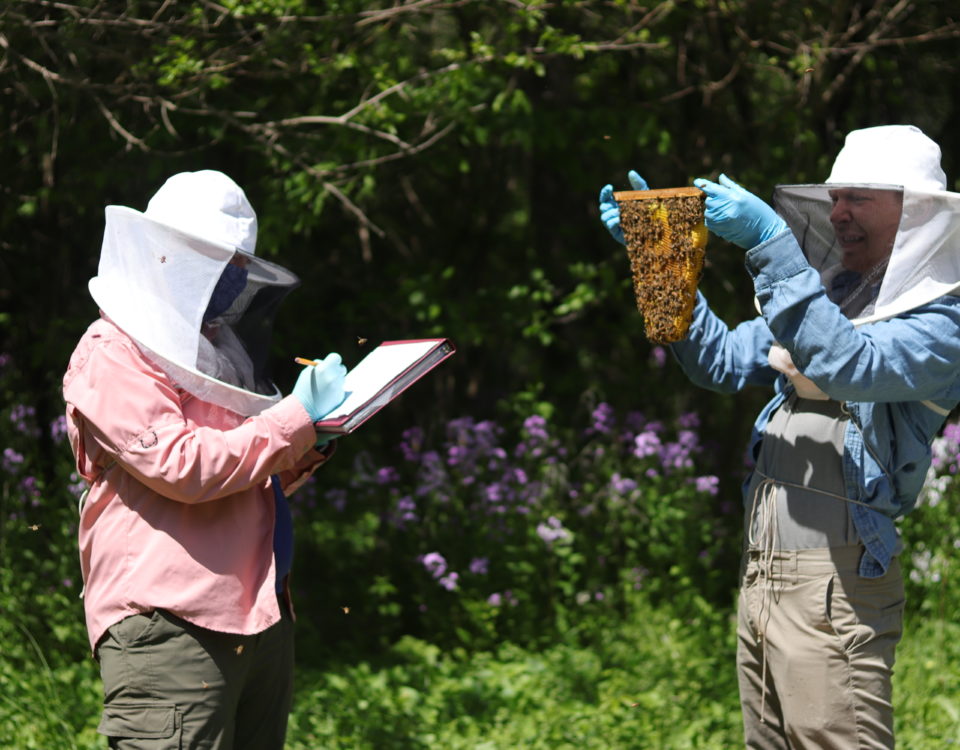- All-In-One Beekeeping for the Bees
- +1-608-728-8233
- info@beepods.com
Do Honey Bees Like Pumpkin as Much as Humans?

Pumpkins are just one edible plant that are possible because of bees
Fall is that time of year that a lot of people look forward to. The cool weather, the beautiful fall leaves, pumpkin farms and corn mazes , hot apple cider, and donuts.
October is pumpkin season, there is no way around that! Whether you are taking part in eating some pumpkin bars with cream cheese frosting or drinking your pumpkin spice latte from Starbucks, I bet you haven’t considered how those pumpkins grew. Without bees, as we beekeepers, but probably few pumpkin-lovers know, we would not have pumpkins or some of the other delicious fall food we like to eat.
Pumpkins, gourds, watermelon, squash and many others are part of the Cucurbitaceae family, commonly known as cucurbits. This plant family is very distinguishable and can be referred to as vine vegetables.
Most species of cucurbits, produce unisex flowers, separate male and female flowers-on the same plant and the male flowers are usually outnumbering the female flowers. With these flowers only being receptive to fertilization for a very short period of time (usually about one day) and the pollen from male flowers dies rapidly in heat, they must be pollinated first thing in the morning when the sun has yet to wilt the flowers. Typically, this would be the job of a honey bee but you will see that honey bees are not the best candidate for this job.
Honey Bees
Across the world, honey bees pollinate all types of flowers and plants, including some cucurbit plants such as pumpkin and squash. However, unlike humans who can’t get enough of our pumpkin spice, bees would rather go elsewhere for a number of reasons.
- Bees like to forage in warmer climate
Typically, bees want to forage in temperatures around 72-77 degrees but the minimum temperature is around 54 degrees. Other bees, such as squash bees, typically pollinate pumpkins in the early morning when the temperature is too cold for honey bees. (Brrrrr).
- Honey bees prefer to forage midday to afternoon
Pumpkin flowers only have a few hours to be fertilized and this happens early in the morning and usually ends before noon. This is not an ideal time for honey bees to be foraging and pollinating these cucurbit plants.
- Pumpkin flowers do not offer as much nectar as other flowering plants
Pumpkin pollen is typically large and very sticky which can occasionally get stuck to the honey bees legs. This happens to bumblebees as well which also means they are not the best option for pollination.
Although bumblebees start to forage earlier in the day and are more efficient at pollinating cucurbit plants than honey bees are, they are still not the best.
Squash Bees
Squash bees are outstandingly efficient pollinators when it comes to pollinating the Cucurbitaceae family. Their foraging schedule often falls in sync with that of squash flowers, which is when they visit most actively and produce massive pumpkins! By checking wilted flowers in the afte rnoon you can monitor them easily enough to see if there’s been any activity that morning.
rnoon you can monitor them easily enough to see if there’s been any activity that morning.
If you spend a lot of time around squash and pumpkins, you will likely see them pollinating the flowers or even hanging out looking for the ladies. It only takes on average 6 to 10 squash bees to fully pollinate a female flower and they get it done fast. Most of this gets done within the first half hour of their foraging trip.
Unlike honey bees and bumblebees, squash bees like all of this pollen getting stuck to their legs. Their hairy hind legs are extremely effective at picking up and transferring the pollen from the male to female flowers.
If you have any plants from the Cucurbitaceae family or want to start growing some pumpkin or squash, keep an eye out for squash bees. Remember the next time you eat that pumpkin treat, buy some pretty gourds, or grab your pumpkin cold brew, make sure to thank the squash bees! As always, if you want to learn more about any kinds of bees, contact us at beepods.com/contact or ask one of our beekeepers!
Elizabeth Allon
Latest posts by Elizabeth Allon (see all)
- Short But Mighty: The Stages of Life - January 26, 2022
- Honey Bees Vs. Highways - January 19, 2022
- 4 Ways to Save The Bees in 2022 - January 12, 2022



